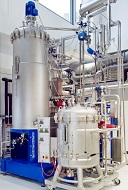
Artificial single-stranded DNA (ssDNA) with user-defined sequences and lengths is increasingly required in large quantities to exploit the potential of new technologies such as genome editing or DNA origami. In principle, biotechnological mass production of ssDNA can be achieved using Escherichia coli in a high-cell-density process via the secretion of phagemid particles.
Preliminary work recently succeeded in producing non-infectious phagemid particles with user-defined ssDNA. This allows for the first time the cross-contamination free and thus safe biotechnological production of ssDNA with E. coli at any contract manufacturer. In the laboratory stirred tank reactor, an optimized fermentation process was used to achieve a 40-fold increase in maximum product concentration compared to previous scalable ssDNA production methods.
Current challenges for unlimited mass production of user-defined ssDNA and DNA nanoobjects (DNA origami) are the scale-up of the entire process chain up to the
m3-scale (fermentative production of phagemid particles, isolation of ssDNA and autocatalytic self-assembly of DNA nanoobjects). For application in the pharmaceutical field, a high purity of the DNA nanoobjects must be ensured. Contamination by genomic DNA, ssDNA fragments and endotoxins must be excluded by suitable process steps.
The aim of this joint research project with the Chair of Biomolecular Nanotechnology (Prof. Hendrik Dietz) at the TUM School of Natural Sciences is the process engineering design of this process chain from gene to DNA nanoobject up to the m3-scale to enable scalable mass production using E. coli. The scale-up studies will be carried out at the TUM Pilot Plant for Industrial Biotechnology in Garching.